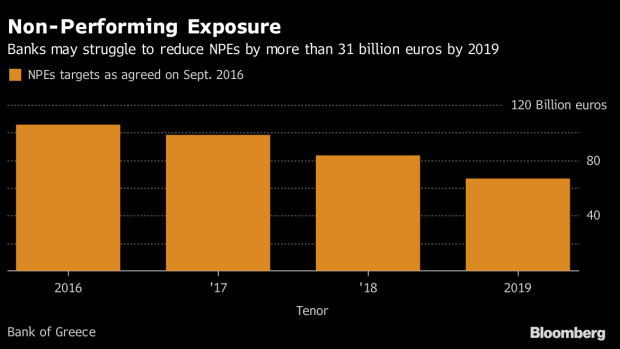May 21, 2018
Greece's Post-Bailout Growth Plan Targets Banks, NPLs, Business
, Bloomberg News

(Bloomberg) -- The Greek government’s master plan to restore growth, after it emerges from eight years under harsh bailout conditions this August, revolves around a key factor that could jump start its economy: its banks.
Prime Minister Alexis Tsipras will present to his cabinet on Monday at 1 p.m. in Athens the 110-page plan, which sets as its main priority the reduction of non-performing loans, the elimination of capital restrictions and the improvement of bank governance. Such steps will increase “the ability of the sector to serve the growing needs of the real economy,” according to a copy of the document obtained by Bloomberg News.
As part of a “transformation of the Greek financial sector,” the government pledged to set up cooperative banks that will operate at a regional level to finance small and medium-sized companies and local businesses. Maintaining adequate levels of capital at the nation’s four biggest banks is “a highly important element of the strategy.” Greece’s banking sector is the most highly concentrated in the euro area, as the systemic banks hold around 96 percent of total financial assets, according to the document.
Greece reached a technical agreement in Athens this weekend with its creditors that will allow conclusion of its fourth and final bailout program review, enabling policy makers to proceed with designing a framework for the country’s post-program monitoring and determining what sort of strings would be attached to debt relief. Greek Finance Minister Euclid Tsakalotos said such a mechanism will be discussed at the June 21 Eurogroup meeting.
Bad Loans
Greece’s banks, which passed the European Central Bank’s stress tests this month, are still burdened with one of the highest levels of non-performing loans in Europe, at nearly 50 percent of total loans. The banks were hit hard as the country lost a quarter of its economic output in its crisis and underwent the world’s biggest sovereign-debt restructuring in 2012.
The gradual withdrawal of the government from supporting the systemically important banks “will be thoroughly designed, on the basis of a rational shareholder’s practice, in order to achieve fair terms and a smooth transition,” according to the plan, while finding strategic investors will also be important for strengthening financial stability.
With its high NPL levels, the management of bad loans is considered key for the banks to be able to concentrate on their commercial function and support activities of viable businesses and the real economy.
Management Company
The government plans to assess the costs and benefits of adopting an alternative procedure to resolve bad loans, such as setting up an asset management company in compliance with recent European Commission guidelines.
Greek banks have pledged to reduce non-performing exposures by 37 percent, to 64.6 billion euros ($76 million) from 101.8 billion euros, while non-performing loans will fall 47 percent to 38.6 billion euros from 72.8 billion euros, between June 2017 and 2019.
Last, but not least, the removal of capital restrictions on withdrawals and the opening of new accounts will complete the liberalization of domestic banking transactions, ending controls put in place when talks between Tsipras and Greece’s creditors in 2015 teetered on the brink as the nation entered its third bailout program. Increased limits for transferring capital abroad for enterprises and individuals, will also facilitate business activity.
A series of tools to fund small and medium-sized businesses in combination with other entities, such as the European Investment Bank and the European Bank of Reconstruction and Development, will be set up to support the economy, along with a Greek plan for a Hellenic Development Bank.
The HDB will help in the financing of SMEs and startups, cooperatives and social enterprises as well as public entities. It will not focus on retail banking but may act as a wholesale intermediary for commercial banks, private investors and other financial intermediaries.
--With assistance from Vassilis Karamanis.
To contact the reporter on this story: Eleni Chrepa in Athens at echrepa@bloomberg.net
To contact the editors responsible for this story: Jerrold Colten at jcolten@bloomberg.net, Steve Geimann, Paul Tugwell
©2018 Bloomberg L.P.